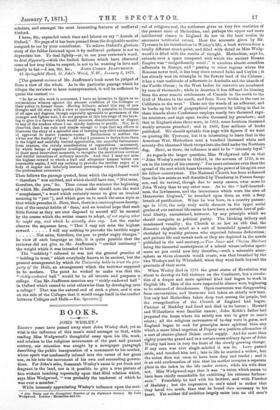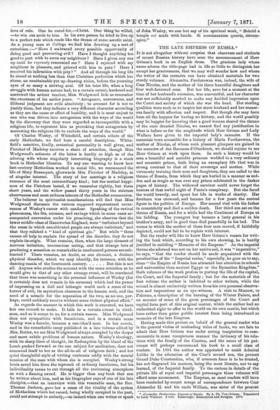BOOKS.
JOHN WESLEY.* EIGHTY years have passed away since John Wesley died, yet so vital is the influence of this man's mind amongst us that, while reading Miss Wedgwood's thoughtful essay upon his life, work, and relation to the religious movements of the past and present century, our attention was caught by a newspaper paragraph describing the public inauguration of a monument to his mother, whose spirit was confessedly infused into the career of her great son, as his into the movement of his own and succeeding genera- tions. For John's sake, Susannah Wesley's name is yet fresh and fragrant in the land, nor is it possible to give a true picture of him without touching repeatedly upon that filial relation which, says Miss Wedgwood, "was probably the tenderest of which he was ever a member."
While intensely appreciating Wesley's influence upon the revi-
• John Wesley and the Evangelical Reaction of the Eighteenth Century. By mile Wedgwood. London : Macmillan and Co.
val of religious zeal, the authoress gives us very few statistics of the present state of Methodism, and perhaps the upper and more intellectual classes in England do not in the least realize its enormous territorial extent. Hear the accounts given by Mr. Tyerman in his introduction to Wesley's life, a book written from a totally different stand-point, and filled with detail as Miss Wedg- wood's is filled with the results of thought. Methodism, says he, extends over a space compared with which the ancient Roman Empire was " insignificantly small ;" it numbers almost countless adherents in Europe, and " passing to other regions where the Romans never trod, it has long since entered India and Ceylon ; it has already won its triumphs in the flowery land of the Chinese it has a vast multitude of adherents in Australia and the islands of the Pacific Ocean ; in the West Indies its converts are numbered by tens of thousands ; while in America it has diffused its blessing from the most remote settlements of Canada in the north to the Gulf of Mexico in the south, and from Nova Scotia in the east to California in the west." These are the words of an adherent, and he backs up his bit of geographical eloquence by telling us that in these islands alone Conference employs nearly two thousand regu- lar ministers, and nigh upon twelve thousand lay preachers ; and that in England alone there were, in 1864, some fourteen thousand weekly sermons preached ; and in 1866, four millions of books published. We should sprinkle this page with figures if we went on quoting Mr. Tyerman, but it is interesting to learn that in the American War, Methodism sent a hundred thousand white and seventy-five thousand black troops into the field under the Northern flag. Here, as there, its influence is said to be " intensely loyal."
As regards the larger question, Miss Wedgwood tells us that "John Wesley's return to Oxford, in the autumn of 1729, is an era in the history of his country." Far more extensive even than the spread of the sect which bears his name is he power of his spirit over his fellow-countrymen. The National Church has been redeemed from the low estate so well described by Thackeray in Parson Samp- son, and its revival, though due to many causes, owes more to John Wesley than to any other man. As to the " half-hearted- ness, the lawlessness, and the irreverence which were the sins of Hanoverian England," he breathed upon them as with a fiery breath of purification. When he was born, in a country parson- age in 1703, the only truly noble element in the upper social grades of our national life seems to have been a certain love of poli- tical liberty, unsustained, however, by any principle which we should recognize as political purity. The blinking bribery and unashamed venality ; the Church at so low an ebb that the domestic chaplain acted as a sort of household spaniel ; letters cherished by wealthy patrons who expected fulsome dedications; and private life and morals such as they are depicted in the novels published in the mid-century,—Tom Jones and Clarisa Harlowe being the immortal masterpieces of a school whose inferior speci- mens no pen could now fitly describe,—such a miserable atmo- sphere as these elements would create, was that breathed by the two Wesleys and by Whitefield, when they went forth beyond the precincts of their sects.
When Wesley died in 1791 the great storm of Revolution was about to develop its full violence on the Continent, but a revolu- tion of a deeper and more spiritual kind had begun to work in English life. Men of the more respectable classes were beginning to be ashamed of drunkenness. Open coarseness was disappearing from conversation, and literature had taken an utterly new tone. Not only had Methodism taken deep root among the people, but the evangelization of the Church of England had begun. Fletcher of Madeley had lived and died in its bosom ; Howard and Wilberforce were familiar names ; John Keble's father had prepared the home where his saintly son was to grow to man's estate ; all the religious movements of to-day were in germ, and England began to seek for principles more spiritual than any which a mere blind negation of Popery or a positive affirmation of a sort of electro-plated Deism could supply. And for more than eighty years the grand and in a certain sense solitary figure of John Wesley had been in very the front of the slowly-growing change-. If any man was ever single-minded it was he. Love passed aside, and touched him not ; late in life he married a widow, but the union does not seem to have been deep and tender ; and it is an odd confirmation of this that his mother occupies a separate place in the index to the life under review, while his wife does not. Miss Wedgwood says that it was "a union which seems to have been chiefly remarkable for exhibiting his extreme forbear- ance." Friendship he had with his brother, and with Fletcher of Madeley ; but the impression in one's mind is rather that they loved him much, than that he found them necessary to his heart. Yet neither did ambition largely enter into an old man's
love of rule. One he cared for,—Christ. One thing he willed, —to win our souls to him. In his own person he tried to live up to a perfect rule which reads like the dream of some ascetic saint. As a young man at College we find him drawing up a sort of catechism :—" Have I embraced every possible opportunity of doing good and preventing evil ? Have I thought anything too good to part with to serve my neighbour ? Have I given any one up until he expressly renounced me ? Have I rejoiced with my neighbour in pleasure, and grieved with him in pain ? Have I received his infirmities with pity? " And all through his long life he aimed at nothing less than that Christian perfection which has shone, an unattainable yet up-drawing vision, before the yearning eyes of so many a striving soul. Of his later life, when a long struggle with human nature had, to a certain extent, hardened and narrowed the ardent teacher, Miss Wedgwood bids us remember the sweetness of his earlier years. " Arrogance, narrowness, and illiberal judgment are evils absolutely ; to account for is not to justify them, but they indicate a very different character according as they are the cause or effect of hostility, and it is most unjust to one who was driven into antagonism with the ways of the world by the discovery that they were regarded as incompatible with a religious life, to represent him as provoking that antagonism by narrowing the religious life to exclude the ways of the world."
Of Charles Wesley., of Whitefield, and certain others of the early Methodists, we find here a careful description. White- field's sensitive, kindly, oratorical personality is well given, and Fletcher' of Madeley receives a share of attention, though Miss Wedgwood's estimate of the latter is hardly so high as of the adoring wife whose singularly interesting biography is a stock book in Methodist libraries. To any one wanting to know how last-century Methodism worked in social life, we recommend the life of Mary Bosanquet, afterwards Mrs. Fletcher of Madeley, as of singular interest. The story of her marriage is a religious romance of the most extraordinary kind ; but the mutual happi- ness of the Fletchers lasted, if we remember rightly, but three short years, and the widow passed thirty years in the strictest observances and most arduous labours of the Methodist communion.
The believer in spiritualist manifestations will find that Miss Wedgwood discusses the various supposed supernatural occur- rences of Wesley's career with candour. Speaking of the revival phenomena, the fits, screams, and ravings which in some cases ac- companied conversion under his preaching, she observes that the lower middle-class of Hanoverian England, were "turbulent beyond the sense in which uncultivated people are always turbulent," and that they relished a " kind of spiritual gin." But while " these -causes all help to explain the spread of the disorder, they do not explain its origin. What remains, then, when the large element of nervous irritation, unconscious acting, and that strange love of producing a sensation so remarkable in uneducated persons are sub- tracted ? There remains, no doubt, as one element, a distinct physical disorder, which we may identify, for instance, with the -dancing mania of the fourteenth century But this is not -all. Anyone who studies the account with the same attention as he would give to that of any other strange event, will be convinced that there was something in the personal influence of Wesley (for it certainly does not remain in his sermons) which had the power of impressing on a dull and lethargic world such a sense of the horror of evil, its mysterious closeness to the human soul, and the need of a miracle for the separation of the two, as no one, per- haps, could suddenly receive without some violent physical effect."
As regards the manner in which this work is executed, we have but one remark to make. It fails to a certain extent in vivid- ness, and as it seems to us, for a certain reason Miss Wedgwood does not sympathize with fanaticism, and in a certain sense Wesley was a fanatic, because a one-idea'd man. In her novels, -and in the remarkable essay published in a late volume edited by Mrs. Butler, we see Miss Wedgwood always occupied by the deeper !and more subtle problems of human nature. Wesley's theology, with its sharp lines of thought, its Redemption by the blood of the Lamb pushed forward as the one subject for meditation, does not -commend itself to her as the all-in-all of religious faith ; and her quiet thoughtful style of writing contrasts oddly with the mental tension of the man with whom she is occupied. Wesley's strong brain saved him from the reproach of ordinary fanaticism, but his individuality seems to cut through all the environing atmosphere as with a flaming sword. He is bigger than any book that can be written about him, and as his biographer says of one of his late disciples,—that an interview with this venerable man, the Rev. Thomas Jackson, gave her a sense of the vitality of the system of Methodism which her record, being wholly occupied in the past, could not attempt to embody,—.so indeed when one writes or speak of John Wesley, we can but say of his spiritual work, " Behold a temple not made with hands. Si monumentum quaris, circum- spice."































 Previous page
Previous page